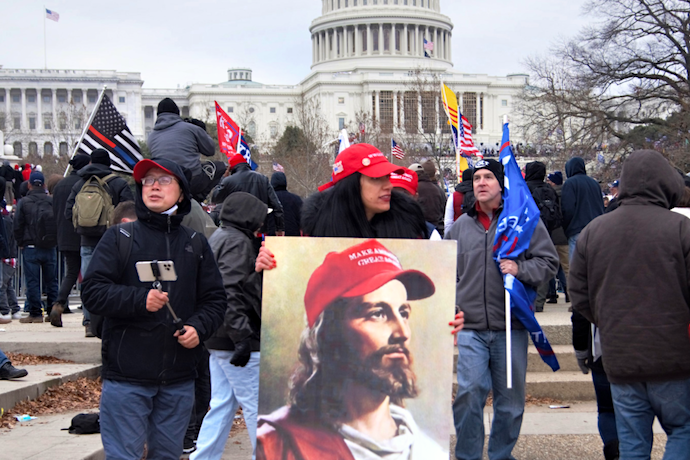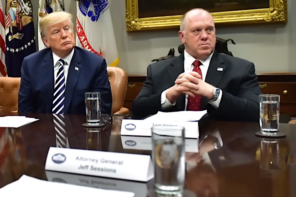Most of us don’t want to grow up to be our parents, especially when we’re in our twenties and ready to forge our own path in the world. For better or for worse, age often proves that we’re more like our forebears than we’d like to admit. This is true for the young American conservatives who are unimaginatively called the New Right—and who think of themselves as replacing the Christian Right. In their minds, they’re a new breed of conservative who will challenge American power structures and liberal elites in ways their predecessors never dreamed of doing.
In a 2021 article at the New Republic, Nate Hochman, a “rising star” in young conservative circles and a fellow at the National Review, put it this way: “Conservatism in 2021 means radicalism. We have to think of ourselves as counterrevolutionaries or restorationists who are overthrowing the regime.”
While Hochman’s approach is jarring, there’s nothing novel about it. In 1964, Barry Goldwater, the GOP nominee for president, proclaimed that “extremism in the defense of liberty is no vice” and “moderation in the pursuit of justice is no virtue!” One of the foot soldiers in Goldwater’s failed presidential campaign was Paul Weyrich, the architect of what became known as the New Right—and a key figure in the formation of the Religious Right, what was essentially the Christian Right—in the 1970s. “We are different from previous generations of conservatives… We are no longer working to preserve the status quo,” Weyrich said in the early 1980s. “We are radicals, working to overturn the present power structure of this country.”
While one might chalk up Mr. Hochman’s perception that the current iteration of the New Right is qualitatively different from its predecessors to youthful exuberance, there’s a keen irony in the deep resonances between Hochman’s and Weyrich’s statements about American conservatism.
In a recent guest essay at the New York Times, Hochman argues that contemporary American conservatism has left the Christian Right—which was inspired by Goldwater and built by Weyrich, along with Jerry Falwell, Tim LaHaye, and many others—behind in favor of a more secular, expansive, and dynamic movement that’s protecting a “beleaguered American way of life.”
According to Hochman, the New Right of 2022 has shed the religious concerns of the previous generation in favor of all out culture war. He uses the metric of church attendance to argue that the decline in institutional Christianity has opened space for a new brand of American Republicans anchored by “non-college-educated, middle- and lower-middle-class white people,” who “unapologetically place citizens over foreigners, majorities over minorities, the native-born over recent immigrants, the normal over the transgressive and fidelity to a homeland over cosmopolitan ideals.”
Hochman concludes that declines in church attendance mean that the influence of the Christian Right has been waning since the end of George W. Bush’s presidency.
It’s true that church attendance has decreased over the last decade and a half. Fewer Republicans are members of churches than at the turn of the millennium; and more Americans now identify as “nones,” unaffiliated with any religion. However, scholars of religion have long maintained that using church attendance as a bellwether for interpreting the influence of Christianity on American politics leads to sophomoric conclusions about the declining influence of religion on our public square. Thus, in his quest to fashion a new American conservatism, Mr. Hochman misses the mark by concluding that religious conservatives are no longer a core demographic of the GOP.
One of the categories scholars draw upon to understand how Christianity pervades American conservative politics is Christian nationalism. According to Samuel Perry and Andrew Whitehead, Christian nationalism describes a cultural identity more than affiliation with a church or regular church attendance. In other words, many Christian nationalists may seldom attend church or read the Bible, swear like sailors, and have no problem with divorce, and other behaviors clearly proscribed by the Bible. Christian nationalism is, in the words of Perry and Whitehead, less about what we’ve traditionally understood as Christian beliefs and doctrines and more about “historical identity, cultural preeminence, and political influence.” Rather than a stable ideology, it is a cultural identity, more a matter of how one thinks of oneself and the stories one draws on than a coherent theological belief system.
For many Christian nationalists, the country has experienced a precipitous decline since the 1960s—when Goldwater and Weyrich set the stage for the New Right and the Christian Right to merge into the Moral Majority of the 1980s. In their new book The Flag and the Cross, Samuel Perry and Yale sociologist Philip Gorski argue that Christian nationalists have a certain understanding of the country’s founding and history. Here’s how they summarize it in a recent op-ed at the Washington Post:
America was founded as a Christian nation; the founders were traditional Christians; the founding documents are biblically based; God has therefore bestowed immense wealth and power on America and given it a mission to spread freedom and religion around the world; but that mission and those blessings are now threatened by the presence of non-Whites, non-Christians and non-native-born people on American soil. Today this story is propagated by a veritable Christian-nationalist industry that includes radio stations, video series, scores of books and entire organizations dedicated to telling White conservative Christians that the nation is their birthright.
For Hochman, the only way to measure Christianity’s influence on American conservatism is through church attendance or how often a politician or leader references God in their political discourse (he mentions how Ron DeSantis, governor of Florida, is “nominally” Catholic but rarely talks about religion in public). Using these metrics naturally leads Hochman to the conclusion that the new generation of the GOP is the “nonreligious right.”
Hochman points to two figures who exemplify this supposed counterrevolution in American politics. First there’s Ron DeSantis, governor of Florida and a potential challenger to former president Trump in the 2024 GOP presidential primary.
Then there’s Christopher Rufo, the ideologue who’s been one of the central figures in the conservative crusade against critical race theory. Hochman cites Rufo in order to demonstrate the secular novelty of the latter’s approach to politics:
“The goal is to protect these people, Middle Americans of all racial backgrounds—working class and middle class—to protect them against what I think is a hostile and nihilistic elite that is seeking to impose its values onto the working and middle classes to bolster their own power, prestige, status and achievement.”
Yet, a closer look at the issues these two figures have championed reveals how Christian nationalism remains an animating force in the GOP’s culture wars.
Mr. DeSantis recently signed Florida’s “Don’t Say Gay” bill into law. The law outlaws the teaching of any content related to gender or sexuality to students “in kindergarten through grade 3 or in a manner that is not age appropriate or developmentally appropriate for students in accordance with state standards.” It is, according to DeSantis’ critics, a way to silence the LGBT community and erase the voices of LGBT youth and teachers. However, such laws hardly represent a new approach by revolutionary conservatives. In fact, they’re part of a nearly century-long campaign by conservatives to control school curricula and claim the moral high ground by framing liberals as indoctrinating forces.
As the anthropologist Sophie Bjork-James observed recently here on Religion Dispatches, “For 45 years Christian Right campaigns seeking to limit the civil rights of sexual minorities have instead framed their efforts as protecting children.” The recent spate of “Don’t Say Gay Bills” follows this blueprint—and was born from this movement.
“Don’t Say Gay bills follow, in many ways, the template of similar laws over the past century,” writes Michael Bronski at the Boston Review. “In significant ways, ‘Don’t Say Gay’ laws—and obsessions with ‘grooming’ more broadly—are old Christian fears about sin and danger given a new face, and express this by recycling medieval anti-Semitic tropes of the blood libel, simply substituting LGBTQ people for Jews as the supposed threat to children.”
In sum, Mr. DeSantis’ “Don’t Say Gay” campaign is not a new tactic in the Right’s never-ending culture wars. It is, unfortunately, part of a long lineage of attacks on public schools by the Christian Right and its allies. These attacks intensified during the 1970s as part of a counterrevolution to new sex-ed initiatives and the integration of schools across the South.
Hochman also highlights Christopher Rufo, claiming that Rufo’s crusade against CRT represents a new wave of nonreligious conservatism. The author and researcher Anne Nelson, however, has shown just how deeply the anti-CRT campaigns were influenced by the Council for National Policy—the secretive organization started by none other than the architect of the Christian Right, Paul Weyrich.
“As they absorbed the loss of the 2020 elections, the leadership of the religious right saw signs they had begun to exhaust the available supply of new conservative evangelical voters in critical districts,” Nelson writes at the Washington Spectator. “Polls also indicated that a crucial bloc of swing voters, college-educated white suburban women, were increasingly disaffected with Trump and were often unmoved by the anti-abortion message. But polling also showed that as the Covid-19 epidemic wore on, these voters were increasingly anxious about their children, their public schools, and conflicting public health policies.”
In order to capitalize on this pandemic weariness, the Council for National Policy invested in a campaign against the supposed teaching of critical race theory in America’s schools. By the time Chris Rufo began tweeting about CRT in March of 2021, the CNP had already inspired the “grassroots” organization, Parents Defending Education (or DefendingEd), in Virginia. Soon thereafter anti-CRT pieces appeared at The Federalist and on Fox News. By June, stalwarts of the Christian Right such as Christian Broadcasting Network founder Pat Robertson and Tony Perkins of the Family Research Council had launched their own attacks on CRT.
In short, a closer look at the origins of the conservative attacks on CRT and school curricula reveals how they were incubated in the Council for National Policy, the network founded by Paul Weyrich, and carried out by the foot soldiers of the Religious Right.
What’s at stake in recognizing the ongoing pervasiveness of Christian nationalism in conservative politics is the ability to understand the motivations, organizing forces, and integrating symbols that drive the American Right. As I argue in my forthcoming book, Preparing for War: The Extremist History of White Christian Nationalism – And What Comes Next, there’s no coherent way to understand the animus that drives MAGA Nation and Trump’s role as the de facto leader of the Republican Party apart from the half-century span of history from Goldwater to the Big Lie. It’s not that there hasn’t been a counterrevolution in American conservatism. It’s just that Mr. Hochman is about 60 years late to the start of the party—one that was infused with conservative Christian forces then, and remains so now.





